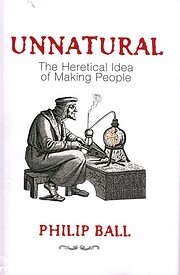

Cliquer sur une vignette pour aller sur Google Books.
|
Chargement... Unnatural: The Heretical Idea of Making People (2011)par Philip Ball
 Aucun Actuellement, il n'y a pas de discussions au sujet de ce livre.   ) )aucune critique | ajouter une critique
* Can we make a human being? * That question has been asked for many centuries, and has produced recipes ranging from the homunculus of the medieval alchemists and the clay golem of Jewish legend to Frankenstein's monster and the mass-produced test-tube babies in Brave New World. * All of these efforts to create artificial people are more or less fanciful, but they have taken deep root in Western culture. They all express fears about the allegedly treacherous, Faustian nature of technology, and they all question whether any artificially created person can be truly human. Legends of people-making are tainted by suspicions of impiety and hubris, and they are regarded as the ultimate 'unnatural' act - a moral judgement that has its origins in religious thought. * In this fascinating and highly topical study, Philip Ball delves beneath the surface of the cultural history of 'anthropoeia' - the creation of artificial people - to explore what it tells us about our views on life, humanity, creativity and technology, and the soul. From the legendary inventor Daedalus to Goethe's tragic Faust, from the automata-making magicians of E.T.A Hoffmann to Mary Shelley's Victor Frankenstein - the old tales and myths are alive and well, subtly manipulating the current debates about assisted conception, embryo research and human cloning, which have at last made the fantasy of 'making people' into some kind of reality. Aucune description trouvée dans une bibliothèque |
Discussion en coursAucunCouvertures populaires
 Google Books — Chargement... Google Books — Chargement...GenresClassification décimale de Melvil (CDD)570.1Natural sciences and mathematics Life Sciences, Biology Life Sciences Theory And InstructionClassification de la Bibliothèque du CongrèsÉvaluationMoyenne: (3.71) (3.71)
Est-ce vous ?Devenez un(e) auteur LibraryThing. |
||||||||||||||||||||||||||||||||||||||||||||||||||||||||||||||||||||||||||||||||||||||||||||||||||||||||||||||||||||||||